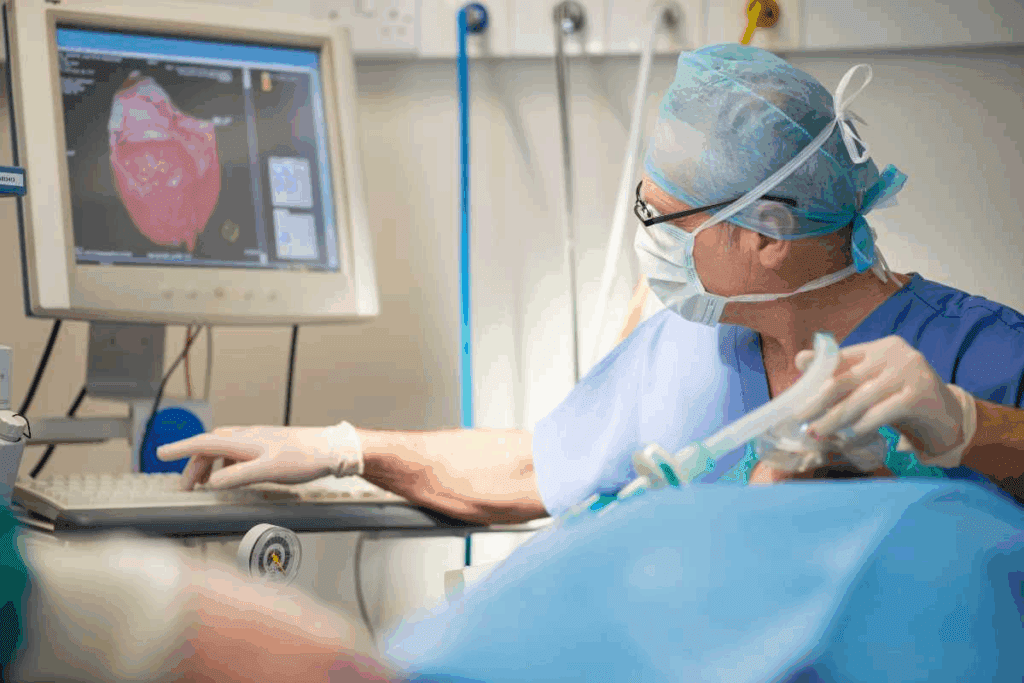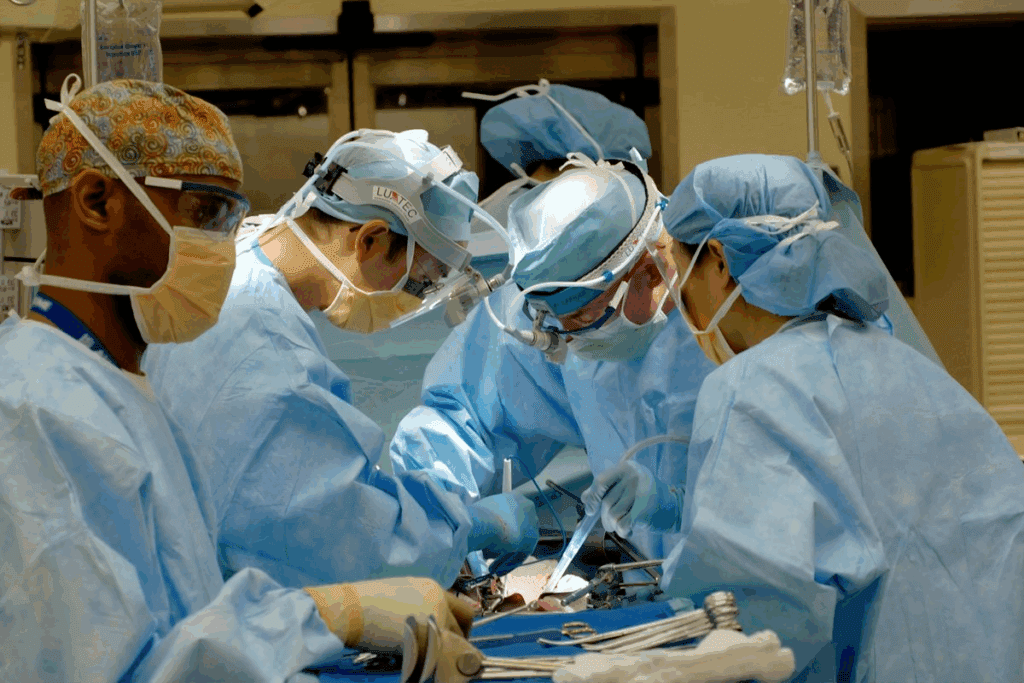
Atrial fibrillation (AFib) is a common heart condition. It causes irregular heart rhythms. Cardiac ablation, or catheter ablation, is a procedure to treat it. It creates scars to stop abnormal electrical impulses.
Learn how serious is heart ablation surgery, its risks, and whether it can cure atrial fibrillation effectively.
At Liv Hospital, we know choosing cardiac ablation is a big decision. Our team offers expert care and advanced protocols. We help you understand the risks and how well it works.
Key Takeaways
- Cardiac ablation is a minimally invasive procedure to treat atrial fibrillation.
- The procedure involves creating scars to stop abnormal electrical impulses.
- Liv Hospital offers multidisciplinary expertise and patient-centered care.
- Understanding the risks and success rates is key for patients.
- Cardiac ablation can greatly improve the life of AFib patients.
Understanding Heart Ablation Surgery and Its Purpose

Cardiac ablation is a treatment that helps the heart beat normally again. It’s used for irregular heartbeats that don’t get better with medicine. Knowing about cardiac ablation helps patients make smart choices about their treatment.
What Is Cardiac Ablation?
Cardiac ablation uses energy to destroy bad heart pathways. This can be heat (radiofrequency ablation) or cold (cryoablation). The choice depends on the condition and the patient’s health.
Types of Heart Ablation Procedures
There are many heart ablation procedures for different heart issues. Catheter ablation is the most common. It uses a thin tube to reach the heart and fix the problem. Surgical ablation is done during open-heart surgery.
- Catheter Ablation: Uses thin tubes to deliver energy.
- Surgical Ablation: Done during open-heart surgery.
Common Conditions Treated with Ablation
Cardiac ablation treats many arrhythmias, like AFib, SVT, and VT. Atrial fibrillation is a big one. The Medical organization says ablation is best for those who can’t get better with medicine.
Understanding cardiac ablation helps patients talk better with their doctors. It lets them discuss their conditions and treatments more clearly.
Atrial Fibrillation: Why Ablation Might Be Recommended

Atrial fibrillation (AFib) is more than a heart issue; it changes lives. It causes an irregular heart rhythm. This can lead to symptoms from mild to severe.
Understanding AFib and Its Impact on Quality of Life
AFib can really affect your life, causing symptoms like palpitations and shortness of breath. These symptoms can make simple tasks hard. It also raises the risk of stroke and heart failure, making treatment key.
When Medication Fails: The Case for Ablation
At first, doctors use medicine to manage AFib. But if it doesn’t work or causes bad side effects, ablation is considered. Ablation aims to fix the heart’s electrical issues.
Choosing ablation involves a detailed look at your symptoms, past treatments, and health.
Goals of Ablation for AFib Patients
The main goals of ablation are to fix the heart’s rhythm, improve symptoms, and boost quality of life. It also aims to lower the risk of AFib-related problems. Achieving these goals can greatly improve a patient’s health.
| Goal | Description | Benefit |
| Restore Normal Heart Rhythm | Ablation targets and destroys abnormal electrical pathways. | Reduces symptoms of AFib |
| Improve Symptoms | By eliminating the source of arrhythmia. | Enhances quality of life |
| Reduce Risk of Complications | Lower risk of stroke and heart failure. | Improves long-term health outcomes |
Understanding AFib’s effects and medication’s limits helps doctors decide on ablation. Ablation’s goals match improving patient outcomes, making it a good choice for some.
How Serious Is Heart Ablation Surgery?
Patients often wonder about the seriousness of heart ablation. This surgery is less invasive than open-heart surgery but is a big deal. It needs careful thought.
Comparing Ablation to Traditional Heart Surgery
Traditional heart surgery is big and takes a long time to recover. Heart ablation, on the other hand, uses smaller incisions. The Medical organization says it’s less invasive but has risks.
Ablation is safer than open-heart surgery because it’s less invasive. But, it’s not risk-free. Its seriousness should be taken seriously.
The Invasiveness Scale: Where Ablation Stands
Ablation’s invasiveness can vary. Some use one catheter, others more. The invasiveness depends on the number of catheters, incision size, and procedure complexity.
Recovery Expectations After Ablation
Recovery after ablation varies by person and procedure. But, it’s usually shorter than traditional heart surgery.
| Recovery Aspect | Ablation | Traditional Heart Surgery |
| Hospital Stay | 1-3 days | 5-7 days or more |
| Return to Normal Activities | 1-2 weeks | 6-12 weeks |
| Full Recovery | 2-4 weeks | 3-6 months |
Knowing about heart ablation’s seriousness and recovery is key for those considering it. It’s less invasive but a big procedure that needs careful thought and planning.
The Procedure: What Happens During Heart Ablation
Understanding heart ablation is key for those considering it. It’s a treatment for heart issues like atrial fibrillation. We’ll walk you through the steps of this treatment.
Pre-Procedure Preparation
Before heart ablation, tests are done to check if you’re a good candidate. These include echocardiograms, stress tests, and blood work. Preparation is key to a successful outcome, and our medical team will guide you.
Patients are told to stop certain meds before the procedure. They also need someone to drive them home. Following a specific diet and staying hydrated is advised. Clear instructions from your healthcare provider will help minimize risks.
Step-by-Step Through the Ablation Process
During cardiac ablation, catheters are guided through blood vessels to the heart. The Medical organization says, “Catheter ablation is a procedure that uses a catheter to destroy (ablate) abnormal electrical pathways in the heart.”
“Catheter ablation is a highly effective treatment for certain heart rhythm disorders.”
The procedure involves several key steps:
- Insertion of catheters through a vein in the groin or arm.
- Guiding the catheters to the heart using imaging technology.
- Identifying the source of the abnormal heart rhythm.
- Ablating the targeted area using energy.
Types of Energy Used in Ablation
Heart ablation uses different energies, like radiofrequency and cryoablation. Radiofrequency ablation uses heat, while cryoablation uses cold. The choice depends on your condition and the doctor’s preference.
Each energy type has its benefits and risks. Our team will discuss these with you to find the best option for you.
Potential Risks and Complications of Cardiac Ablation
It’s important for patients to know about the risks of cardiac ablation for atrial fibrillation. This procedure is generally safe but comes with some risks.
Common Minor Complications
Most people do well after cardiac ablation. But, some minor issues can happen. These might include:
- Temporary discomfort or pain at the catheter insertion site
- Bruising or swelling where the catheters were inserted
- Mild chest discomfort
- Temporary heart rhythm disturbances
These minor problems usually go away quickly after the procedure.
Serious Complications (2-4.5% Rate)
Even though rare, serious problems can happen. The chance of serious issues is between 2 to 4.5 percent. Some serious complications include:
- Cardiac tamponade: A serious condition where fluid builds up around the heart.
- Stroke or transient ischemic attack (TIA): Though rare, these can happen due to blood clots during the procedure.
- Significant bleeding or vascular complications
- Damage to the heart’s electrical system, possibly needing a pacemaker
Talking to your doctor about these risks is key. This helps understand the specific risks based on your health.
Long-Term Risks to Consider
Cardiac ablation can treat atrial fibrillation well. But, there are long-term risks to think about:
- The chance of atrial fibrillation coming back, possibly needing more procedures
- Scarring or narrowing of the pulmonary veins
- Potential long-term effects on heart function, though more research is needed
Regular check-ups with your doctor are important. This helps watch for these risks and manage any symptoms that come back.
In summary, while cardiac ablation is a good option for atrial fibrillation, knowing the risks is vital. Understanding these risks helps patients make better choices for their care.
Success Rates: Can Ablation Cure Atrial Fibrillation?
Ablation for AFib has shown promising results. But what does ‘success’ really mean? It’s about restoring normal heart rhythm and improving life quality for patients.
Defining “Cure” in the Context of AFib
Defining a “cure” for AFib through ablation is complex. Success is measured by the absence of AFib episodes after the procedure. It doesn’t mean the patient will never have AFib again. It means a significant reduction in episodes.
First Procedure Success Rates (50-80%)
Studies show the success rate of a single ablation procedure ranges from 50% to 80%. This range varies due to factors like patient health, AFib duration, and the technique used.
Patients with paroxysmal AFib tend to have higher success rates. Early intervention can improve outcomes.
Factors Affecting Success Probability
Several factors influence ablation success. These include:
- The duration of AFib before the procedure
- The presence of underlying heart disease
- The patient’s age and overall health
- The experience of the electrophysiologist performing the procedure
Understanding these factors helps set realistic expectations for patients considering ablation.
Repeat Ablations and Cumulative Success
For some, a single ablation procedure may not be enough. Repeat ablations can improve success rates. The cumulative success rate after multiple procedures can be significantly higher.
| Number of Procedures | Cumulative Success Rate |
| 1 | 50-80% |
| 2 | 70-90% |
| 3 or more | 80-95% |
This table shows the importance of considering cumulative success rates. It highlights the value of repeat procedures in improving outcomes for AFib ablation.
Patient Selection: Who Should Consider Ablation
Choosing the right patients for heart ablation is key to its success. This procedure treats atrial fibrillation (AFib) by scarring or destroying heart tissue. The decision to have ablation depends on health, AFib severity, and response to other treatments.
Ideal Candidates for Heart Ablation
Ideal candidates for heart ablation often have AFib not controlled by medication. Those with paroxysmal AFib (episodes lasting up to seven days) might benefit more than those with persistent AFib. Younger patients with fewer health issues tend to do better with the procedure.
Key characteristics of ideal candidates include:
- Symptomatic AFib despite medical therapy
- Failed or intolerable antiarrhythmic drug therapy
- Presence of AFib triggers that can be targeted
- Minimal structural heart disease
When Ablation May Not Be Recommended
Heart ablation is not always the best choice. Patients with significant heart disease, like advanced heart failure or severe valve disease, may not benefit. Older patients or those with many chronic conditions also face higher risks.
Contraindications for ablation may include:
- Advanced age with significant comorbidities
- Severe heart failure or significant left ventricular dysfunction
- Presence of a large left atrium
- Active infection or other serious medical conditions
The Importance of a Thorough Evaluation
A detailed evaluation is vital to see if a patient is right for heart ablation. This includes a medical history, physical exam, ECG, echocardiogram, and sometimes MRI or CT scans. We also look at symptoms, quality of life, and past treatments.
The evaluation process helps us to:
- Identify risks and benefits of the procedure
- Determine success likelihood based on patient characteristics
- Discuss other treatment options and their outcomes
By carefully choosing patients and doing thorough evaluations, we can improve the success rate of heart ablation. This helps those with AFib live better lives.
Recovery and Post-Procedure Care
After heart ablation, how you recover is key to its success. We’ll walk you through the recovery stages and what to expect.
Immediate Post-Procedure Experience
Right after the procedure, you’ll stay in a recovery area for a few hours. Our team will watch your heart and overall health closely. You might feel some soreness where the catheter was, but it’s usually short-lived. Following our care instructions is important to avoid complications.
Here are some common feelings right after:
- Fatigue or feeling tired
- Mild chest discomfort
- Soreness at the catheter site
- Palpitations or irregular heartbeats
Short-Term Recovery Timeline
The first few days to a week after the procedure is the short-term recovery. We advise:
- Rest and avoid hard activities
- Follow our medication instructions
- Watch for signs of complications like infection or bleeding
Feeling weak or tired is normal, but most people can get back to normal in a week. You’ll likely be on medication for a few weeks until the procedure fully works.
Long-Term Follow-Up and Monitoring
Long-term follow-ups are vital to see how well the ablation worked and to catch any long-term issues. We’ll schedule regular check-ups to check your heart and adjust your meds as needed.
Important parts of long-term follow-up include:
- Regular visits with your cardiologist or electrophysiologist
- Watching for any return of atrial fibrillation symptoms
- Adjusting meds to keep your heart rhythm right
- Making lifestyle changes to help your heart health
By sticking to our care advice and going to your follow-up appointments, you can increase your chances of a good outcome from your heart ablation.
The Importance of Experienced Centers and Specialists
Experienced centers and specialists are key to the success and safety of cardiac ablation procedures. Heart ablation surgery is complex, needing a high level of expertise. Choosing the right medical center and specialist is vital for the best results.
Center Experience and Patient Outcomes
The experience of the medical center and its electrophysiologists greatly affects patient outcomes. Studies show that high-volume centers have better success rates and fewer complications. A study in the Journal of the American College of Cardiology found that “hospitals performing a high volume of ablation procedures have lower rates of in-hospital complications and mortality.”
“The volume-outcome relationship in cardiac ablation highlights the importance of referring patients to experienced centers.”
When looking at centers, consider these factors:
- The number of ablation procedures performed annually
- The experience and qualifications of the electrophysiologists
- The availability of advanced technology and techniques
- The quality of pre- and post-procedure care
Questions to Ask Your Electrophysiologist
It’s important to ask the right questions when talking to your electrophysiologist:
- What experience do you have with cardiac ablation procedures?
- How many ablation procedures do you perform annually?
- What are your success rates and complication rates?
- What technology and techniques do you use during the procedure?
- How will my condition be monitored before and after the procedure?
| Criteria | High-Volume Center | Low-Volume Center |
| Annual Ablation Procedures | >100 | |
| Success Rate | 80-90% | 60-70% |
| Complication Rate | 2-4% | 5-10% |
Finding High-Volume Ablation Centers
To find a high-volume ablation center, patients can:
- Ask their primary care physician for recommendations
- Check professional certifications and memberships of electrophysiologists
- Research online reviews and patient testimonials
- Contact local hospitals and cardiac centers to inquire about their ablation programs
Choosing an experienced center and specialist is a critical step towards a successful cardiac ablation procedure. By doing thorough research and asking the right questions, patients can significantly improve their chances of a positive outcome.
Alternatives to Heart Ablation for AFib Management
There are many ways to manage AFib, not just ablation. Other treatments can help reduce symptoms and improve life quality.
Advanced Medication Approaches
Managing AFib often starts with medication. There are advanced ways to treat it:
- Anti-arrhythmic drugs to control heart rhythm.
- Rate-control medications to manage heart rate.
- Anticoagulants to prevent stroke.
These medicines can work well for many people. They’re good for those who can’t have ablation or don’t want it.
Lifestyle Modifications for AFib Management
Making lifestyle changes is key in managing AFib. Simple adjustments can make a big difference:
- Dietary changes, like cutting down on caffeine and alcohol.
- Regular exercise that fits the patient’s fitness level.
- Stress management techniques, like meditation and yoga.
By making these changes, patients might need less medicine. They can also improve their heart health.
Other Procedural Options
There are other procedures for managing AFib, aside from ablation:
- Cardioversion: Uses electrical shocks to fix heart rhythm.
- Pacemaker implantation: Helps manage AFib by keeping heart rate steady.
- Surgical Maze procedure: Creates scar tissue to stop abnormal heart signals.
These options give patients and doctors more choices. They help tailor treatment to what each person needs.
Conclusion: Making an Informed Decision About Heart Ablation
Heart ablation surgery is a big step that might cure atrial fibrillation. It’s important to think about the good and bad sides of it. Knowing what makes it work or not is key.
Talking to your doctor is the first step. They can help you choose the right path. Understanding the surgery, its risks, and what affects its success helps you make a smart choice.
Deciding on heart ablation depends on many things. Like how bad your symptoms are, your health, and what you prefer. Being involved in this choice makes you more confident and ready for what comes next.
Choosing heart ablation needs careful thought and talking to doctors. We suggest getting advice from experts in electrophysiology. Don’t hesitate to ask about your options.
FAQ
Is cardiac ablation considered a serious surgery?
Cardiac ablation is a big deal, but it’s less invasive than open-heart surgery. It has risks, but they’re low when done by experts.
Can ablation cure atrial fibrillation?
Ablation can greatly improve life for many with atrial fibrillation. It’s not a sure cure, but success rates are good, up to 80% after one try. More tries can help even more.
How serious is heart ablation surgery compared to traditional heart surgery?
Heart ablation is less invasive than traditional surgery. It uses smaller cuts, less damage, and quicker recovery. But, it’s a serious procedure that needs careful thought and prep.
What are the possible risks and complications of cardiac ablation?
Rare but serious complications include discomfort, cardiac tamponade, or stroke. The risk of serious problems is low, about 2-4.5%.
Are ablations safe?
Ablations are safe when done by skilled doctors in busy centers. Risks are there, but they’re low with the right care and follow-up.
What is the recovery process like after heart ablation?
Right after, you might feel some pain, but it goes away in a few days. Most people can get back to normal in a week to 10 days. But, it can take weeks to fully recover. Regular check-ups are key to catch any problems early.
How do I choose the right doctor and center for heart ablation?
Look for doctors who specialize in ablation and work in busy centers. Check their experience, success rates, and how often they do ablations. This helps you make a smart choice.
Are there alternatives to heart ablation for managing atrial fibrillation?
Yes, there are other ways to manage atrial fibrillation. This includes medicines, lifestyle changes, and other procedures. The best option depends on your health and symptoms.
Can ablation cure AFib long-term?
Ablation can help many people with AFib for a long time. But, calling it a “cure” is tricky. Success depends on many things, like the type of AFib and the doctor’s skill. Some might need more treatments or ongoing care.
Is it dangerous to have surgery with AFib?
Surgery risks are higher with AFib that’s not well-managed. But, with the right care, many can have surgery safely. It’s important to work with your doctors to get your AFib under control before surgery.
What are the characteristics of ideal candidates for heart ablation?
The best candidates have AFib symptoms that medicines can’t fix or manage. They should have a good quality of life despite their condition. The type of AFib matters, but each case is unique.
Reference:
Calkins, H., Hindricks, G., Cappato, R., Kim, Y.-H., Saad, E. B., Aguinaga, L., … & Kuck, K.-H. (2017). 2017 HRS/EHRA/ECAS/APHRS/SOLAECE expert consensus statement on catheter and surgical ablation of atrial fibrillation. Heart Rhythm, 14(10), e275-e444. https://www.sciencedirect.com/science/article/pii/S1547527117303691



































